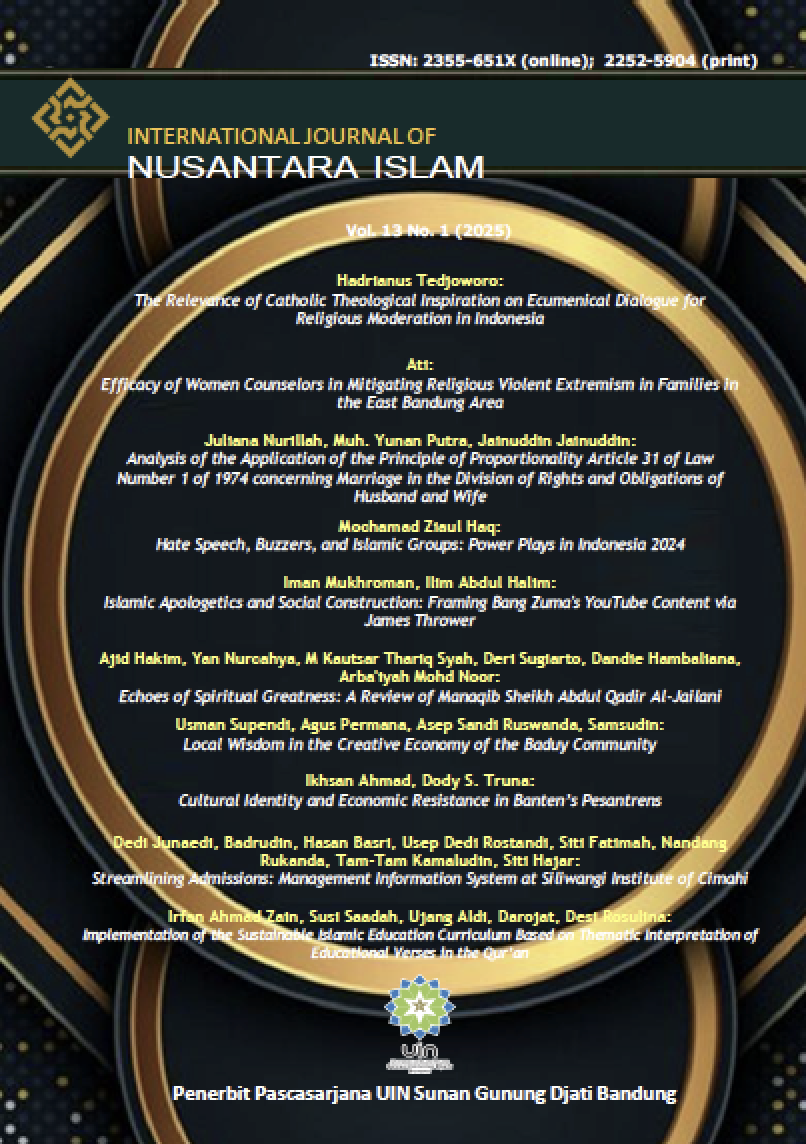Cultural Identity and Economic Resistance in Banten’s Pesantrens
Main Article Content
Abstract
This study examines the resistance movement led by Kyai leaders of Salafiyah Islamic Boarding Schools (Pesantren) in Pandeglang and Serang Districts, Banten, against the establishment of PT Mayora factory in 2016. The resistance emerged in response to what was perceived as modern capitalist expansion threatening environmental sustainability and local cultural identity. Employing a qualitative approach with case study methodology, this research investigates traditional pesantren's dual role as religious educational institutions and as frontline defenders of ecological balance and cultural heritage. The study frames this resistance within political theology, analyzing how moral values derived from Islamic teachings inform opposition to capitalism's negative impacts on local communities. Data were collected through in-depth interviews, participatory observation, and document analysis. The findings reveal that traditional pesantren serve both as religious educational institutions and as guardians of local wisdom through social-religious movements guided by the principle of Amar Ma'ruf Nahi Munkar (promoting good and preventing harm). The conflict illustrates the tension between economic interests and religious-cultural values. This study recommends strengthening traditional pesantren's role in maintaining socio-ecological sustainability within sustainable development frameworks.
Article Details
The Authors submitting a manuscript do so on the understanding that if accepted for publication, copyright of the article shall be assigned to International Journal of Nusantara Islam, Sunan Gunung Djati State Islamic University.
The copyright encompasses exclusive rights to reproduce and disseminate articles in all forms and media, including reprints, photographs, microfilm, and similar reproductions, as well as translations. Some or all of the contents of this journal can be stored in databases and transmitted in any form and media without the need for written permission from the International Journal of Nusantara Islam, Sunan Gunung Djati State Islamic University.
The Editors and the Advisory International Editorial Board make every effort to ensure that no wrong or misleading data, opinions or statements be published in the journal. In any way, the contents of the articles and advertisements published in the International Journal of Nusantara Islam (IJNI) are sole and exclusive responsibility of their respective authors and advertisers.
References
Achmadin, B. Z., Kawakip, A. N., Nafis, M. M., Barizi, A., Asrori, M., & Amrullah, A. M. K. (2024). The Future of Pesantren: Reconciling Tradition with Global Educational Trends. Jurnal Pendidikan Agama Islam (Journal of Islamic Education Studies), 12(2), 197–222.
Åhman, H., & Thorén, C. (2021). When Facebook becomes faithbook: Exploring religious communication in a social media context. Social Media+ Society, 7(3), 20563051211041644.
Alfiyanto, A., Pranajaya, S. A., Ikhwan, M., Gumilang, R. M., Ghazali, M., & Hidayati, F. (2024). Towards Transformative Islamic Education: Reflections and Projections on the Direction of Islamic Education. Ulul Albab: Majalah Universitas Muhammadiyah Mataram, 28(2), 88–98.

